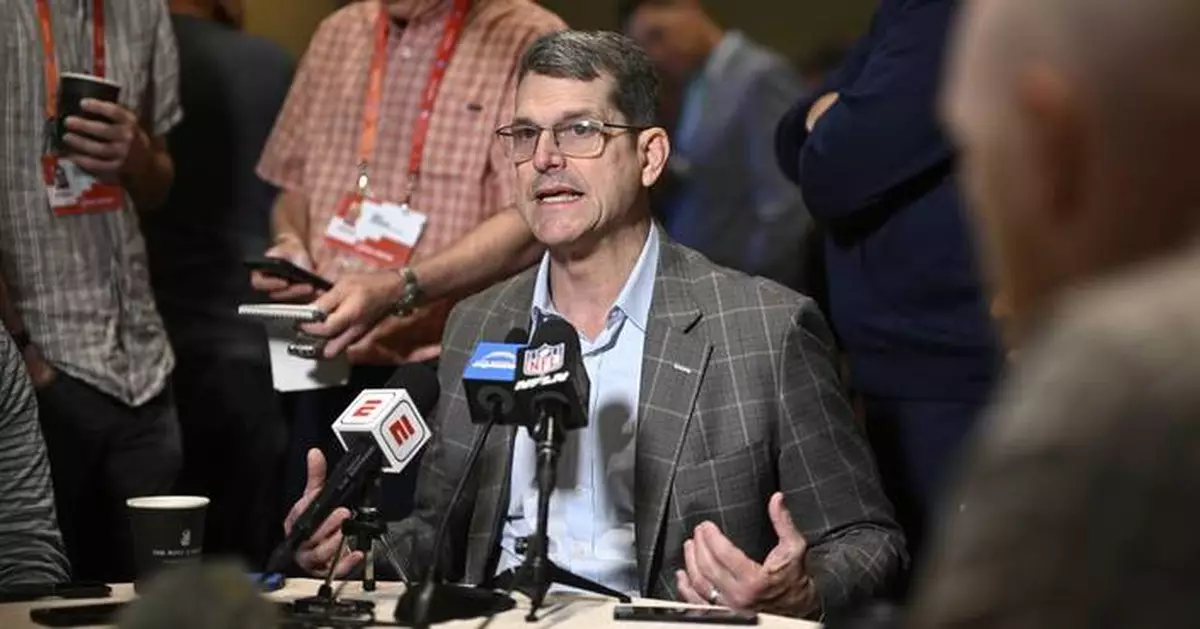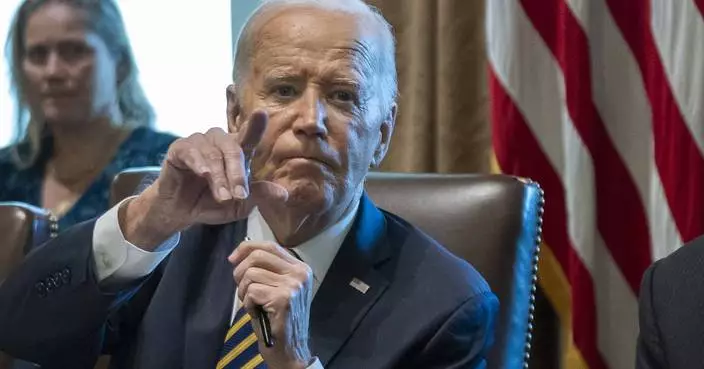Michigan was given three years of probation, fined and hit with recruiting limits by the NCAA on Tuesday after football coaches and staff had impermissible contact with recruits and players under then-coach Jim Harbaugh while access was restricted during the COVID-19 pandemic.
The NCAA said it had reached a negotiated resolution with the school that has been approved by the committee on infractions involving five former and current coaches and staffers, but it did not include allegations that Harbaugh failed to cooperate with investigators. That is now a separate case.
“We are pleased to reach a resolution on this matter so that our student-athletes and our football program can move forward. We have no additional information and cannot comment further on other aspects of the NCAA’s inquiries,” Michigan athletic director Warde Manuel said in statement.
Harbaugh's attorney, Tom Mars, said the coach was not invited to participate in the settlement process or aware that an agreement had been reached between the school on the NCAA. Harbaugh is now coach of the Los Angeles Chargers.
“I'm not saying he would have participated. That would have depended on what terms the NCAA wanted," Mars told AP. “Seems odd they didn't even give Jim the opportunity to participate or decline. What's that say about the NCAA's intentions?”
The recruiting case is also separate from the NCAA's investigation into impermissible in-person scouting and sign stealing that roiled Michigan's national championship season in 2023, and resulted in a three-game suspension of Harbaugh by the Big Ten.
The multiple cases could open up Michigan to being deemed a repeat violator by the NCAA, which could trigger harsher sanctions. The fine was not announced, though NCAA guidelines call for a fine of $5,000 for mitigated Level I violations.
After leading Michigan to its first national championship since 1997, Harbaugh left his alma mater earlier this year to become coach of the Chargers. The NCAA did not name him in Tuesday's announcement.
“The negotiated resolution also involved the school’s agreement that the underlying violations demonstrated a head coach responsibility violation and the former football head coach failed to meet his responsibility to cooperate with the investigation," the NCAA said. "The school also agreed that it failed to deter and detect the impermissible recruiting contacts and did not ensure that the football program adhered to rules for noncoaching staff members."
The committee said a final decision, including potential violations and penalties for the former coach, was pending.
Besides the three-game suspension for Harbaugh, Michigan also imposed one-game suspensions for then-offensive coordinator Sherrone Moore and assistant Grant Newsome related to the impermissible contact case. Moore, who went 4-0 filling for Harbaugh during his two suspensions, was promoted to head coach after Harbaugh left for the NFL.
Follow Ralph D. Russo at https://twitter.com/ralphDrussoAP and listen at http://www.appodcasts.com. AP college football: https://apnews.com/hub/college-football

FILE - Los Angeles Chargers head coach Jim Harbaugh, center, talks with reporters during an AFC coaches availability at the NFL football owners meetings, Monday, March 25, 2024, in Orlando, Fla. Michigan was given three years of probation, fined and hit with recruiting limits by the NCAA on Tuesday, April 16, after football coaches and staff had impermissible contact with recruits and players under coach Jim Harbaugh while access was restricted during the COVID-19 pandemic.(AP Photo/Phelan M. Ebenhack, File)
NASHVILLE, Tenn. (AP) — A federal judge on Friday temporarily blocked Tennessee from enforcing a law banning adults from helping minors get an abortion without parental permission.
In a 49-page ruling, U.S. District Judge Aleta Trauger argued that the Republican-controlled state cannot “make it a crime to communicate freely” about legal abortion options even in a state where abortion is banned at all stages of pregnancy except for a handful of situations. Trauger's decision means that the law will be placed on hold as the case make its way through court.
“The Tennessee General Assembly apparently determined that, when the topic at hand is ‘abortion trafficking,’ the best interests of the pregnant child are not merely a secondary consideration, but unworthy of particularized consideration at all,” Trauger wrote.
Earlier this year, Tennessee’s Republican lawmakers and GOP Gov. Bill Lee signed off on a proposal making it illegal for an adult who “intentionally recruits, harbors, or transports” a pregnant child or teen within the state to get an abortion without consent from the minor’s parents or guardians. Those convicted of breaking the law risked being charged with a Class A misdemeanor, which requires a nearly one-year jail sentence.
The law, which went into effect July 1, did not contain exemptions for minors who may have been raped by their parents or guardians. Instead, the statute dictated that biological fathers who cause the pregnancy of their daughters, if minors, couldn't pursue legal actions.
The Tennessee law mimicked the so-called “ abortion trafficking ” law enacted in Idaho last year, the first state to ever enact such a statute. However, a federal judge has since temporarily blocked Idaho's version as the case moves through court.
Just before the law was poised to go into effect, Democratic Rep. Aftyn Behn and Nashville attorney Rachel Welty filed a lawsuit on the second anniversary of the Supreme Court’s decision overturning Roe v. Wade, the 1973 decision that had guaranteed a constitutional right to abortion.
Behn called the Tennessee ruling a “monumental victory for free speech and the fight for abortion rights.
“This ruling doesn't just protect Tennesseans — it safeguards the freedom to discuss abortion care across state lines, ensuring that we can continue to offer support, share accurate information, and stand up for the rights of those seeking essential health care everywhere,” she said.
A spokesperson for Attorney General's office, who was fighting to get the case dismissed, did not immediately respond to an emailed request for comment on Friday's ruling.
Trauger's decision sided with Welty and Behn's argument that the Tennessee law was "unconstitutionally vague,” specifically stressing that the word “recruits” is undefined in the statute.
Trauger also raised several First Amendment concerns in her explanation that her ruling would apply across the state, not just to Welty and Behn.
“The freedom of speech guaranteed by the First Amendment is not simply a special protection that the Constitution grants to a few, high-profile speakers so that those speakers can hear themselves talk; it is a protection available to everyone, for the interconnected benefit of everyone, because messages do not gain their fullest power by being uttered, but by being spread,” Trauger wrote.
Tennessee bans abortions at all stages of pregnancy, but there are exemptions in cases of molar pregnancies, ectopic pregnancies, and to remove a miscarriage or to save the life of the mother. Notably, doctors must use their “reasonable medical” judgment — a term that some say is too vague and can be challenged by fellow medical officials — in deciding whether providing the procedure can save the life of the pregnant patient or prevent major injury.
A group of women is currently suing in a separate case to clarify the state’s abortion ban. A court decision is expected soon on whether the lawsuit can continue or if Tennessee's abortion ban can be placed on hold as the legal battle continues.

FILE - An. Abortion rights demonstrator holds a sign during a rally on May 14, 2022, in Chattanooga, Tenn. (AP Photo/Ben Margot, File)











